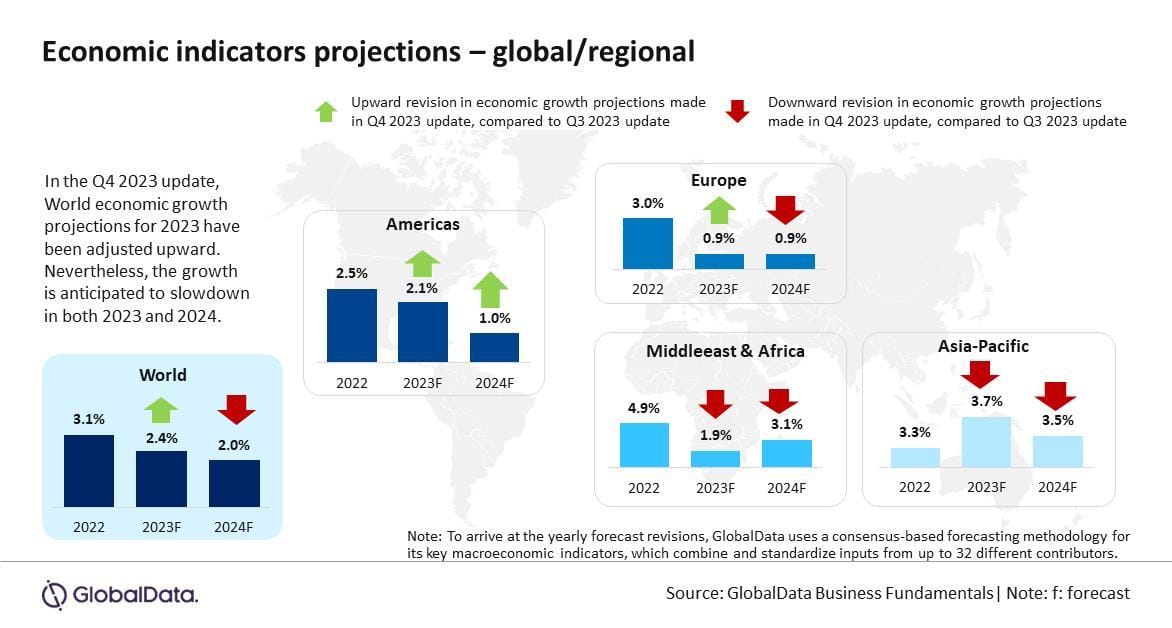Resurfacing inflation concerns from rising energy prices and escalating geopolitical crises introduce uncertainties, prompting a downward revision of 0.2 percentage points for the 2024 global economic growth estimate to 2%, according to GlobalData, a leading data and analytics company.

Amidst a fluctuating global economic landscape marked by improved consumer confidence and a temporary halt in rate hikes, the 2023 global real GDP growth forecast has been adjusted upward to 2.4%, backed by robust employment conditions and substantial fiscal stimulus.However, the horizon is not without challenges.
GlobalData’s latest report, “Global Macroeconomic Outlook – Q4 2023 Update,” reveals that the Asia-Pacific (APAC) region is expected to lead in 2023 with the highest growth rate. However, the 2023 growth forecast for APAC was adjusted downwards in Q4, to 3.7% from 3.8% projections made in Q3 mainly due to disruptions in China and a decrease in external demand.
Similarly, the Middle East and Africa (MEA) region saw downward revisions in growth projections (2.8% in Q4 2023 vs 1.9% in Q3 2023) due to ongoing geopolitical tensions and a reduction in oil production. On a positive note, the economic growth projections for Europe (0.9% vs 0.6%) and the Americas (2.1% to 1.2%) have been raised, credited to improved consumer confidence and a decrease in inflation.
Ramnivas Mundada, Director of Companies and Economic Research at GlobalData, comments: “The ongoing Israel-Hamas conflict presents potential economic repercussions globally, particularly affecting oil prices amid the heightened tensions in the Middle East. Further escalation has the potential to elevate energy costs for a sustained period, impacting various economic sectors and potentially slowing the global economic growth.”

The US is poised for a notable economic growth slowdown in 2024, dropping to an estimated 0.8% from 2.1% in 2023, primarily influenced by the impact of tightening monetary policies. Despite the anticipated easing, inflation is projected to remain above the Federal Reserve’s 2% target.
Europe faces persistent weakness transitioning into a fragile recovery, constrained by tight financing, lingering price pressures (above the ECB’s target of 2%), and Ukraine war uncertainty. Emerging economies, after a robust year, foresee a 2024 growth slowdown, with China’s less-than-ideal recovery contributing to the region’s challenges.
Headline, core, and food inflation in major advanced economies have exhibited a declining trend. Energy prices witnessed a substantial decline until June 2023 but have subsequently rebounded, indicative of the impact of reduced oil production and geopolitical tensions in the Middle East region.
GlobalData revised its global inflation rate projections for Q4 2023, attributing the adjustments to the recent increases in oil prices. The forecast for 2023 now stands at 6.0%, representing a 0.7 percentage point uptick, while the 2024 projection is 4.8%, marking a 1.4 percentage point increase from the Q3 2023 projections.
Geopolitical tensions, subdued demand, and stringent monetary policies pose challenges to global trade. According to GlobalData’s analysis of World Trade Organization data, the 2023 global trade volume growth forecast was revised downward by 0.9 percentage points to 0.8% in October 2023, compared to the April 2023 projection.
Mundada concludes: “In the anticipated 2024 global economic landscape, a slowdown is foreseen due to the re-emergence of energy inflation and high cost of borrowing. While robust service demand and employment offer support, the overall global growth is expected to dip from the previous year. Businesses are advised to prepare for sustained macroeconomic volatility, with potential country-specific deviations.”
Tradersdna is a leading digital and social media platform for traders and investors. Tradersdna offers premiere resources for trading and investing education, digital resources for personal finance, market analysis and free trading guides. More about TradersDNA Features: What Does It Take to Become an Aggressive Trader? | Everything You Need to Know About White Label Trading Software | Advantages of Automated Forex Trading









